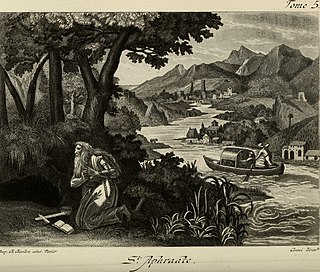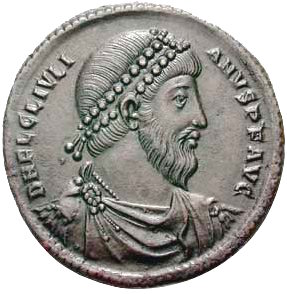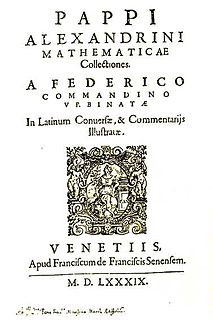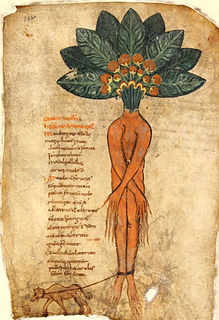 W
WAmphilochius of Iconium was a Christian bishop of the fourth century, son of a Cappadocian family of distinction, born, perhaps at Caesarea, ca. 339/340, died probably 394–403. His father was an eminent lawyer, and his mother Livia was remarkable for gentleness and wisdom. He is venerated as a saint on Nov. 22. In the Orthodox church, he is venerated on Nov. 23.
 W
WAnthony or Antony the Great, was a Christian monk from Egypt, revered since his death as a saint. He is distinguished from other saints named Anthony such as Anthony of Padua, by various epithets of his own: Saint Anthony, Anthony of Egypt, Anthony the Abbot, Anthony of the Desert, Anthony the Anchorite, and Anthony of Thebes. For his importance among the Desert Fathers and to all later Christian monasticism, he is also known as the Father of All Monks. His feast day is celebrated on 17 January among the Orthodox and Catholic churches and on Tobi 22 in the Coptic calendar.
 W
WAphrahat was a Syriac Christian author of the third century from the Persian / Sasanian Empire who composed a series of twenty-three expositions or homilies on points of Christian doctrine and practice. All his known works, the Demonstrations, come from later on in his life. He was an ascetic and celibate, and was almost definitely a son of the covenant. He may have been a bishop, and later Syriac tradition places him at the head of Mar Mattai Monastery near Mosul in what is now Iraqi Kurdistan. He was a near contemporary to the slightly younger Ephrem the Syrian, but the latter lived within the sphere of the Roman Empire. Called the Persian Sage, Aphrahat witnesses to the concerns of the early church beyond the eastern boundaries of the Roman Empire.
 W
WArius was a Libyan presbyter and ascetic, and priest in Baucalis in Alexandria, Egypt. His teachings about the nature of the Godhead in Christianity, which emphasized God the Father's uniqueness and Christ's subordination under the Father, and his opposition to what would become the dominant Christology, Homoousian Christology, made him a primary topic of the First Council of Nicaea, which was convened by Emperor Constantine the Great in 325.
 W
WBasil of Caesarea, also called Saint Basil the Great, was the bishop of Caesarea Mazaca in Cappadocia, Asia Minor. He was an influential theologian who supported the Nicene Creed and opposed the heresies of the early Christian church, fighting against both Arianism and the followers of Apollinaris of Laodicea. His ability to balance his theological convictions with his political connections made Basil a powerful advocate for the Nicene position.
 W
WCyril of Jerusalem was a theologian of the early Church. About the end of 350 AD he succeeded Maximus as Bishop of Jerusalem, but was exiled on more than one occasion due to the enmity of Acacius of Caesarea, and the policies of various emperors. Cyril left important writings documenting the instruction of catechumens and the order of the Liturgy in his day.
 W
WEunomius, one of the leaders of the extreme or "anomoean" Arians, who are sometimes accordingly called Eunomians, was born at Dacora in Cappadocia or at Corniaspa in Pontus. early in the 4th century.
 W
WDidymus the Blind was a Christian theologian in the Church of Alexandria, where he taught for about half a century. He was a student of Origen, and, after the Second Council of Constantinople condemned Origen, Didymus's works were not copied. Many of his writings are lost, but some of his commentaries and essays survive. He was intelligent and a good teacher, but not especially original.
 W
WEphrem the Syrian, also known as Saint Ephrem, Ephrem of Edessa or Ephrem of Nisibis, was a prominent Christian theologian and writer, who is revered as one of the most notable hymnographers of the Eastern Christianity. He was born in Nisibis, served as a deacon and later lived in Edessa.
 W
WEunapius was a Greek sophist and historian of the 4th century CE. His principal surviving work is the Lives of Philosophers and Sophists, a collection of the biographies of 23 philosophers and sophists.
 W
WEusebius of Caesarea, also known as Eusebius Pamphili, was a historian of Christianity, exegete, and Christian polemicist. He became the bishop of Caesarea Maritima about AD 314. Together with Pamphilus, he was a scholar of the Biblical canon and is regarded as one of the most learned Christians of his time. He wrote Demonstrations of the Gospel, Preparations for the Gospel and On Discrepancies between the Gospels, studies of the Biblical text. As "Father of Church History", he produced the Ecclesiastical History, On the Life of Pamphilus, the Chronicle and On the Martyrs. He also produced a biographical work on Constantine the Great, the first Christian Emperor, who was augustus between AD 306 and AD 337.
 W
WGregory of Nazianzus, also known as Gregory the Theologian or Gregory Nazianzen, was a 4th-century Archbishop of Constantinople, and theologian. He is widely considered the most accomplished rhetorical stylist of the patristic age. As a classically trained orator and philosopher he infused Hellenism into the early church, establishing the paradigm of Byzantine theologians and church officials. Saint Gregory was saint patron of medieval Bosnia before the Catholic conquest when he was replaced by Saint Gregory the Great.
 W
WGregory of Nyssa, also known as Gregory Nyssen, was bishop of Nyssa from 372 to 376 and from 378 until his death. He is venerated as a saint in Roman Catholicism, Eastern Orthodoxy, Oriental Orthodoxy, Anglicanism, and Lutheranism. Gregory, his elder brother Basil of Caesarea, and their friend Gregory of Nazianzus are collectively known as the Cappadocian Fathers.
 W
WHegemonius or Pseudo-Hegemonius was a 4th-century Christian who is known only from his presumed authorship of the Acta Archelai, a work on Manichaeism preserved only in Latin. "Traditionally attributed to Hegemonius, the Acta Archelai is the oldest and most significant anti-Manichaean polemical text. Originally composed in Greek in the fourth century, it has survived mainly in a near contemporary Latin translation - substantial section of the Greek version has however survived in the Panarion of Epiphanius. The Acta gives a fictional account of a debate between Mani and Archelaus, the Christian bishop of the city of Carchar in Roman Mesopotamia as well as an important summary of his teaching on cosmogony and a highly polemical version of Mani's life. The work would later exercise enormous influence on anti-Manichaean writings in both Late Antiquity and Middle Ages."
 W
WHeliodorus of Emesa was a Roman writer for whom two ranges of dates are suggested, either about the 250s AD or in the aftermath of Emperor Julian's rule, that is shortly after 363. He is known for the ancient Greek novel called the Aethiopica (Αἰθιοπικά), sometimes called "Theagenes and Chariclia".
 W
WIamblichus was a Syrian Neoplatonist philosopher of Arab origin. He determined the direction that would later be taken by Neoplatonic philosophy. He was also the biographer of the Greek mystic, philosopher and mathematician Pythagoras.
 W
WJulian was Roman emperor from 361 to 363, as well as a notable philosopher and author in Greek. His rejection of Christianity, and his promotion of Neoplatonic Hellenism in its place, caused him to be remembered as Julian the Apostate by the Christian Church.
 W
WLibanius was a Greek teacher of rhetoric of the Sophist school. During the rise of Christian hegemony in the later Roman Empire, he remained unconverted and in religious matters was a pagan Hellene.
 W
WMacarius Magnes is the author of an apology against a Neo-Platonic philosopher of the early part of the fourth century, contained in a manuscript of the fifteenth century discovered at Athens in 1867 and edited by C. Blondel. This work agrees in its dogmatics with Gregory of Nyssa, and is valuable on account of the numerous excerpts from the writings of the opponent of Macarius. These fragments are apparently drawn from the lost Against the Christians of Porphyry or from the Lover of Truth of Hierocles.
 W
WSaint Methodius of Olympus was a Christian bishop, ecclesiastical author and martyr today regarded as a Church Father. He is commemorated on June 20.
 W
WMetrodora was a Greek physician and author of the oldest medical text known to have been written by a woman, On the Diseases and Cures of Women. Her medical treatise covers many areas of medicine, including gynecology, but not obstetrics. It was widely referenced by other medical writers in ancient Greece and Rome, and was also translated and published in Medieval Europe. Nothing is known of Metrodora's identity beyond her name. However, several women physicians are known to have existed in the ancient Greco-Roman world, and she is generally regarded as the first female medical writer.
 W
WOribasius or Oreibasius was a Greek medical writer and the personal physician of the Roman emperor Julian the Apostate. He studied at Alexandria under physician Zeno of Cyprus before joining Julian's retinue. He was involved in Julian's coronation in 361, and remained with the emperor until Julian's death in 363. In the wake of this event, Oribasius was banished to foreign courts for a time, but was later recalled by the emperor Valens.
 W
WPachomius, also known as Pachome, Pakhomios, and Pahom, is generally recognized as the founder of Christian cenobitic monasticism. Coptic churches celebrate his feast day on 9 May, and Eastern Orthodox and Roman Catholic churches mark his feast on 15 May or 28 May. In the Lutheran Church, he is remembered as a renewer of the church, along with his contemporary, Anthony of Egypt on January 17.
 W
WPappus of Alexandria was one of the last great Greek mathematicians of antiquity, known for his Synagoge (Συναγωγή) or Collection, and for Pappus's hexagon theorem in projective geometry. Nothing is known of his life, other than what can be found in his own writings: that he had a son named Hermodorus, and was a teacher in Alexandria.
 W
WPseudo-Apuleius is the name given in modern scholarship to the author of a 4th-century herbal known as Pseudo-Apuleius Herbarius or Herbarium Apuleii Platonici. The author of the text apparently wished readers to think that it was by Apuleius of Madaura, the Roman poet and philosopher, but modern scholars do not believe this attribution. Little or nothing else is known of Pseudo-Apuleius apart from this.